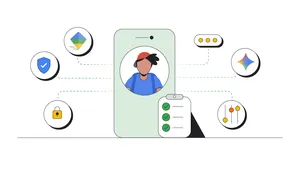A robotics program transforming AI education across Africa

In 2021 our CEO Sundar Pichai announced that Google would invest $1 billion in Africa over the next five years to help boost Africa’s digital transformation. As part of this, we’ve been working on improving connectivity — for example this past May we announced Umoja, a new fiber optic cable connecting Africa to Australia — and supporting local businesses, like startups harnessing the power of AI to revolutionize healthcare.
Another area we are making strides is upskilling youth to better understand AI. Recently, we partnered with UNESCO on a new program called CogLabs, which helps make STEM accessible to all.
UNESCO's CogLabs Educational Robot at UNESCO headquarters

UNESCO CogLabs program educate youth worldwide through robotics and AI
The CogLabs program aims to inspire the next generation of thinkers and creators in classrooms across Africa by providing accessible, hands-on experiences in robotics and machine learning. The primary objective is to enhance awareness and comprehension of AI while making machine learning approachable, rewarding, affordable, scalable regardless of economic background and, above all, enjoyable.
In classrooms with teacher guidance, children learn how to create machine learning models by building a robot requiring 3D printable parts, a smartphone, and basic electronic parts. The educational robot kit was adopted by UNESCO's STEM program in 2019. The Google Partner Innovation team later collaborated with UNESCO to incorporate Teachable Machine to launch the CogLabs pilot in 2021, available in three languages (English, Spanish, French) across Africa, Latin America & Southeast Asia.
These workshops have been conducted in 35 countries both onsite and online to more than 10,000 teachers and students worldwide, empowering educators ultimately fueling the next wave of innovators.
CogLabs app showing how Programs and Models are created to recognize objects and run commands
CogLabs app showing how Programs and Models are created to recognize objects and run commands
CogLabs app showing how Programs and Models are created to recognize objects and run commands
CogLabs app showing how Programs and Models are created to recognize objects and run commands
CogLabs app showing how Programs and Models are created to recognize objects and run commands
CogLabs app showing how Programs and Models are created to recognize objects and run commands
Expanding access by transitioning from desktop to only a smartphone
Most educational robots available in the market come with high costs, complexity, an abundance of options and sensors, as well as closed software and hardware systems. The CogLabs pilot provided broader accessibility with 3D printed parts and open-sourced software — but still required a desktop computer requiring teachers and students to share a limited number of available computers with internet connectivity that has excluded many from engaging in hands-on learning experiences and limiting their exposure to cutting edge technologies.
To broaden accessibility of these tools, Google Partner Innovation collaborated with UNESCO, Infinix and New Zealand-based developer RUSH to complete a mobile-only CogLabs kit that doesn’t require a desktop computer, broadening accessibility and reach across classrooms without requiring an internet connection.
Image features CogLabs robotic kit being assembled using 3D printed parts and an Infinix smartphone

Working with the Ministry of Education Nigeria
This next iteration of CogLabs launched at the United Nations in Abuja, Nigeria on November 13, 2024 in partnership with UNESCO, the Ministry of Education in Nigeria, smartphone manufacturer Infinix and Google through a two-day workshop enabling children to create ML models on devices and customize their robots. During the on-site training, participants engaged in a comprehensive workshop that includes training models using machine learning with visual coding, 3D printed parts by setting up and operating a 3D printer for hands-on experiences.
With a particular focus on empowering today's youth, Infinix recognizes the pivotal role smartphones play in advancing UNESCO's Educational Robot program. As part of this collaboration, Infinix provides hardware support such as smartphones and laptops for UNESCO CogLabs workshops to enhance the program. UNESCO will continue workshops across key markets in Africa as well as Latin America, Middle East and Southeast Asia throughout the year and into 2025.
This partnership reflects a shared commitment to fostering sustainable development, gender equality, and quality education across Africa.






